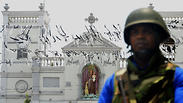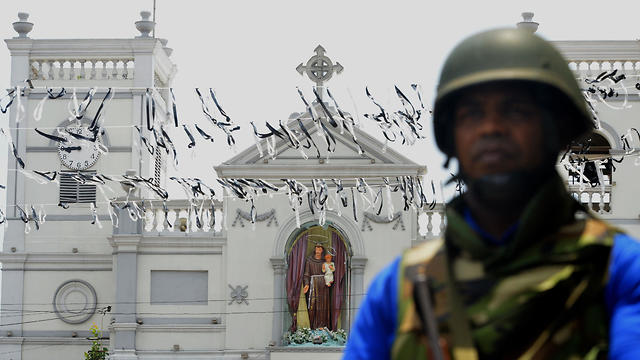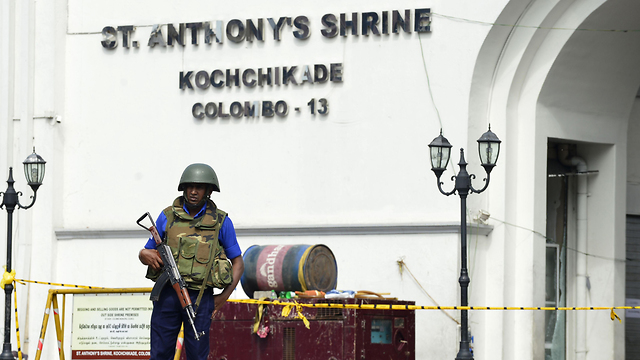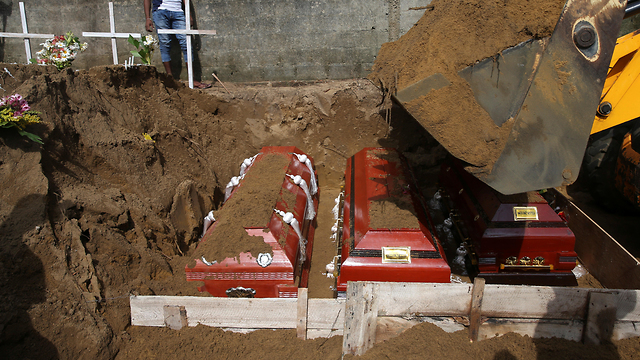
Israel issues travel warning for Sri Lanka, indicating immediate threat
Counter-Terrorism Bureau urges Israelis already on the Indian Ocean island to leave as soon as possible and not approach the sites of Easter Sunday attacks or any other churches; meanwhile, residents of some areas of Sri Lanka’s capital advised to stay indoors
Israel’s Counter-Terrorism Bureau on Thursday raised its travel warning for Sri Lanka to Level 2, indicating an immediate threat. The decision comes in light of Easter Sunday terror attacks on the Indian Ocean island that killed at least 359 people and wounded 500 others.
"In the wake of a deteriorating security situation which might lead to further attacks in the near future, we call upon the Israelis to refrain from traveling to the country, and those already residing in its territory should leave immediately," the bureau said in a statement.
Islamic State on Tuesday claimed responsibility for the suicide bombings, which targeted three churches and three luxury hotels.

The bureau also asked Israelis currently in Sri Lanka not to approach the sites of the bombings as well as churches that had been targeted, follow the instructions of the local security forces and avoid crowded places that lack security.
"Additional explosive devices have already been located and there are fears of additional terrorist attacks,” said the statement. The Prime Minister's Office said the travel warning will be reexamined once the security situation in the country stabilizes.
Sri Lankan Foreign Ministry has confirmed 36 foreigners died in the blasts. The remains of 13 have been repatriated. Fourteen foreigners are unaccounted for, and 12 were still being treated for injuries in hospitals of Sri Lanka's capital of Colombo.
On Thursday, Colombo still remained jittery as authorities set off controlled detonations of suspicious items, soldiers stopped and searched vehicles and some businesses advised staff to stay indoors.
John Keells Holdings, the parent company of the Cinnamon Grand hotel, one of the sites stricken in the Easter Sunday bombings, told employees at its various hotel properties to stay inside until at least 2pm "further to the communications we have received" in an email.
It was not immediately clear where the warning originated, and a police spokesman did not respond to several calls and messages.
The streets around Dematagoda, a wealthy Colombo neighborhood where officials say many of the bombing suspects lived, were quiet Thursday.
Investigators continued to comb through a mansion with nine front balconies where investigators said suspects detonated a ninth bomb on Sunday that killed three police officers who were pursuing them. A white BMW was parked outside a garage partially blown out in the blast.
Sri Lanka's civil aviation authority also banned drones and unmanned aircraft "in view of the existing security situation in the country," according to a statement. Hobby drones have been used by militants in the past to carry explosives. Iraqi forces found them difficult to shoot down while driving out the Islamic State group, whose members loaded drones with grenades or simple explosives to target government forces. And Yemen's Houthi rebels have used drones, most recently to target a military parade in January, killing troops.
A top Sri Lankan official has said that many of the suicide bombers were highly educated and came from well-off families. Junior Defense Minister Ruwan Wijewardene said at least one had a law degree and others may have studied in the UK and Australia.
Australian Prime Minister Scott Morrison said one of the bombers had been in the country on a student visa with a spouse and child before leaving in 2013. A British security official also confirmed one bomber is believed to have studied in the UK between 2006 and 2007.












